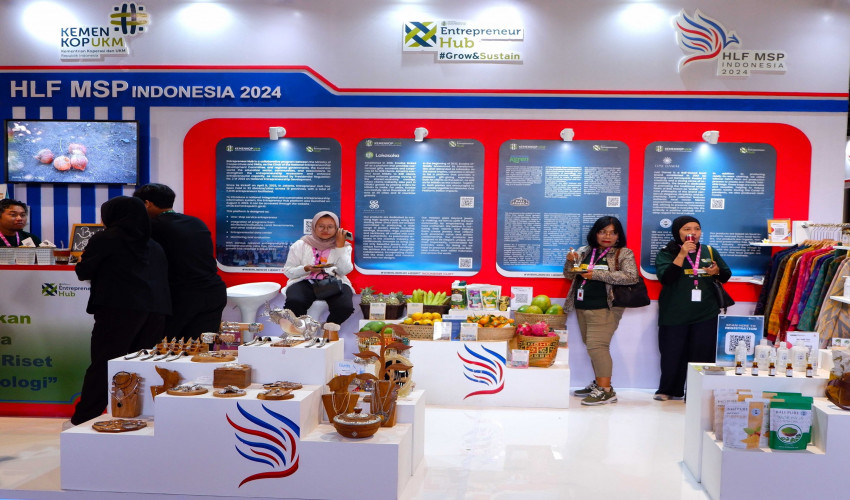Caption: MSMEs exhibition at the HLF MSP & 2nd IAF in Nusa Dua, Bali (Source: Istimewa)
Micro-financing and the strengthening of Micro, Small, and Medium Enterprises (MSMEs) were among the hottest topics discussed at the High-Level Forum on Multi-Stakeholder Partnerships (HLF-MSP) and 2nd Indonesia-Africa Forum (IAF), held in Nusa Dua, Bali, from September 1–3, 2024.
So, what exactly is micro-financing? Micro-financing, or micro-funding, is a global solution designed to provide financial resources to lower-middle income individuals, particularly small-scale entrepreneurs.
Through micro-financing, individuals and small business owners can secure the necessary funds to sustain their enterprises. The ultimate goal is to stimulate economic growth, reduce poverty rates, and positively impact Micro, Small, and Medium Enterprises (MSMEs).
A History of Micro-Financing: Indonesia's Experience Since the 19th Century
The concept of micro-financing in Indonesia can be traced back to the Dutch colonial era, when the country's financial system was strictly regulated by the government.
During that period, Raden Aria Wiriaatmadja, a Purwokerto regent, established a micro-financing institution known as De Poerwokertosche Hulp-en Spaarbank der Inlandsche Hoofden, or the Purwokerto Savings and Loan Bank for Native Nobles. This institution was founded with the aim of shielding low-ranking civil servants, particularly indigenous officials, from debt.
The Significance of Micro-Financing in Advancing Micro, Small, and Medium Enterprises (MSMEs)
Micro-financing plays a pivotal role in a nation's economic system, contributing to equitable economic distribution, especially for small and medium-sized enterprises seeking capital. Additionally, it enhances the standard of living for both individuals and MSMEs by facilitating increased business activities.
To ensure sustainable economic growth, micro-financing programs must reach beyond existing businesses to include low-income individuals aspiring to start their own businesses.
Previously underserved individuals have gained access to banking services through microfinancing, making the nation's financial system more inclusive and accessible to all segments of society.
Economic growth and the expansion of SMEs can have a positive impact, one of which is the creation of job opportunities. Indonesia's unemployment rate is currently quite high, reaching 7.2 million people according to data from the Statistics Indonesia (BPS) in February 2024. Therefore, with the growth of SMEs, it is expected to create new jobs with skilled human resources.
Growth of Creative Economy-Based MSMEs
At the High-Level Forum on Multi-Stakeholder Partnerships (HLF-MSP), Minister of Tourism and Creative Economy/Head of Tourism and Creative Economy Agency, Sandiaga Salahuddin Uno, represented Indonesia in a meeting with the United Nations Conference on Trade and Development (UNCTAD) which was represented by UNCTAD Secretary-General Rebeca Grynspan Mayufis.
"Discussions with UNCTAD have reaffirmed that Indonesia possesses significant potential for growth in the creative economy, investment, and trade sectors. We must capitalize on these opportunities to strengthen Indonesia's position in the global market, particularly among Southern countries," he stated.
The bilateral meeting was a continuation of the Ministry's commitment to UN Resolution 78/133, which focuses on the role of the creative economy as a key driver of sustainable development.
The Indonesian government also invited MSMEs to participate in exhibitions held concurrently with the High-Level Forum on Multi-Stakeholder Partnerships (HLF-MSP) at the Bali International Convention Center and the 2nd Indonesia-Africa Forum at the Mulia Hotel, Nusa Dua, Bali.
The esteemed participants in the exhibitions included a diverse range of MSMEs, featuring batik and tenun (Indonesian traditional woven textile) artisans from the fashion industry, and culinary entrepreneurs specializing in coffee, herbal products, and more.
"Centered around the theme 'Strengthening Multi-Stakeholder Partnerships for Development: Towards a Transformative Change,' this forum (HLF-MSP) aims to empower all stakeholders to develop innovative solutions and take concrete actions that will drive sustainable development in Global South countries," The Deputy for Political, Legal, Defense, and Security Affairs at the Ministry of National Development Planning/National Development Planning Agency (Bappenas) Bogat Widyatmoko stated.
He added that this alternative financing mechanism is crucial for driving the achievement of the Sustainable Development Goals (SDGs) 2030, increasing both inbound and outbound investments, and strengthening Micro-Financing.
